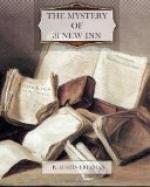But when I came to think about it I remembered that Mrs. Schallibaum had shown some anxiety to prevent the patient from talking. She had interrupted him more than once, and had on two occasions broken in when he seemed to be about to ask me some question. I was “mistaken” about something. What was that something that he wanted to tell me?
It had struck me as singular that there should be no coffee in the house, but a sufficiency of tea. Germans are not usually tea-drinkers and they do take coffee. But perhaps there was nothing in this. Rather more remarkable was the invisibility of the coachman. Why could he not be sent to fetch the coffee, and why did not he, rather than the housekeeper, come to take the place of Mr. Weiss when the latter had to go away.
There were other points, too. I recalled the word that sounded like “Pol’n,” which Mr. Graves had used in speaking to the housekeeper. Apparently it was a Christian name of some kind; but why did Mr. Graves call the woman by her Christian name when Mr. Weiss addressed her formally as Mrs. Schallibaum? And, as to the woman herself: what was the meaning of that curious disappearing squint? Physically it presented no mystery. The woman had an ordinary divergent squint, and, like many people, who suffer from this displacement, could, by a strong muscular effort, bring the eyes temporarily into their normal parallel position. I had detected the displacement when she had tried to maintain the effort too long, and the muscular control had given way. But why had she done it? Was it only feminine vanity—mere sensitiveness respecting a slight personal disfigurement? It might be so; or there might be some further motive. It was impossible to say.
Turning this question over, I suddenly remembered the peculiarity of Mr. Weiss’s spectacles. And here I met with a real poser. I had certainly seen through those spectacles as clearly as if they had been plain window-glass; and they had certainly given an inverted reflection of the candle-flame like that thrown from the surface of a concave lens. Now they obviously could not be both flat and concave; but yet they had the properties peculiar to both flatness and concavity. And there was a further difficulty. If I could see objects unaltered through them, so could Mr. Weiss. But the function of spectacles is to alter the appearances of objects, by magnification, reduction or compensating distortion. If they leave the appearances unchanged they are useless. I could make nothing of it. After puzzling over it for quite a long time, I had to give it up; which I did the less unwillingly inasmuch as the construction of Mr. Weiss’s spectacles had no apparent bearing on the case.
On arriving home, I looked anxiously at the message-book, and was relieved to find that there were no further visits to be made. Having made up a mixture for Mr. Graves and handed it to the coachman, I raked the ashes of the surgery fire together and sat down to smoke a final pipe while I reflected once more on the singular and suspicious case in which I had become involved. But fatigue soon put an end to my meditations; and having come to the conclusion that the circumstances demanded a further consultation with Thorndyke, I turned down the gas to a microscopic blue spark and betook myself to bed.




